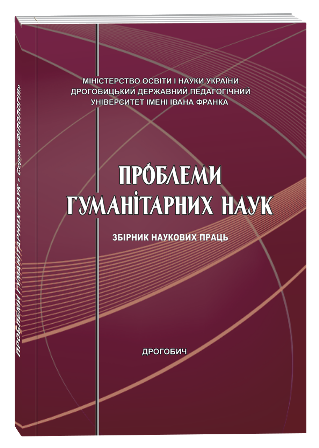THE LINGUISTIC CATEGORIZATION OF MOTION IN AN AQUATIC SPACE (BASED ON UKRAINIAN AND ENGLISH PHRASEOLOGY)
DOI:
https://doi.org/10.24919/2522-4565.2024.60.17Keywords:
phraseology, motion, space, active motion, passive motion.Abstract
Summary. The peculiarities of the philosophical understanding of motion has been clarified; it has been established that motion is a property of matter without which no change can be understood; it has been proved that the category of motion is the main category for a human being, since human life in a certain space and time is impossible without motion; it has been emphasized that the awareness of the importance of water for human life has existed since ancient times, as evidenced by the mythological representations of different cultures; the phrases with a core verb of motion in water space has been distinguished. The aim of the article is a contrastive analysis of idioms with a core component of motion in an aquatic space in non-closely related linguistic and cultural systems (Ukrainian and English). The relevance of the article is motivated by several factors: 1) the requirement to consider the achievements of other sciences (psychology, philosophy, ethnology, cultural studies, etc.) in linguistic analysis, which enables the examination of language as an embodiment of culture, its part, creator, product, and foundation; 2) the need to study the peculiarities of linguistic categorization of motion in water space through phraseology; 3) the necessity of a comparative examination of the content, structure, and functional features of these units in different linguocultural spaces, particularly in the languages of the Slavic and Germanic classification groups. The phraseo-thematic group «Motion in Aquatic Space» as a component of the phraseotematic field «Motion» structured around the concept «Motion» has been clarified in the article. It has been proved that the ideographic categorization of phraseological units makes it possible to reveal a taxonomy of semantic groups of phrases, their paradigmatic and syntagmatic relations, synonymous variants, their qualitative and quantitative typological structure, closely linking the semantics of motion with the motivation of human character traits. Most phrases with the meaning of motion in water have desemantic, obsolete semantics that transform from physical motion itself into the movement of an object in society, active or passive activity, interpersonal relations, some moral and other pragmatic characteristics and assessments. The prospect is to study the motion of animals in an aquatic space in Slavic and Romance languages.
References
Англо-український фразеологічний словник. Укладач К. Баранцев. 2-ге видання, виправлене. Київ : Товариство «Знання», КОО, 2005.
Білоноженко В. та ін. укладачі. Фразеологічний словник української мови. Т. 1, Т. 2. Київ: Наукова думка, 2013. 528 с., 990 с.
Головацький Я. Виклади давньослов’янських легенд, або міфологія. Київ : Довіра, 1991. 91 с.
Краснобаєва-Чорна Ж., Лобасова В. Фразеосемантичне поле «емоції людини» в сучасній українській мові: база даних. Мовознавчий вісник. 2010. Вип. 10. С. 39–43.
Лила M. Мовний образ як компонент мовної картини світу. Теоретична і дидактична філологія. Серія: Філологія. 2018. Вип. 27. С. 55–66.
Пальчевська О. Фразеологізми української мови з просторовим компонентом семантики (спроба лінгвокультурного аналізу). Науковий журнал Львівського державного університету безпеки життєдіяльності «Львівський філологічний часопис». 2017. Вип. 1. С. 55–60.
Селіванова О. Нариси з української фразеології (психокогнітивний та етнокультурний аспекти) : монографія. Київ-Черкаси : Брама, 2004. 276 с.
Словник української мови / Білодід І. К. та ін. [В 11 т.] (1970–1980). URL : http://sum.in.ua/
Сморж Л. Філософія : навч. посіб. Київ: Кондор, 2006. 416 с.
Сошко О. Метафоричне переосмислення просторових ознак у фразеологізмах на позначення внутрішніх характеристик людини (на матеріалі української, німецької та англійської мов). Наукові записки Національного університету «Острозька академія». Серія : Філологія. 2019. Вип. 5. С. 93–95.
Ivanytska N., Ivanytska N. Ukrainian and English verbs : bilateral contrastive cross-linguistic perspective. Advanced Education. 2018. Iss. 9. P. 213–218.
Kopalińskі W. Słownik symboli. Warszawa : Wiedza Powszechna, 1997. Oxford Dictionary of English Idioms. Oxford, 2010. 408 p.
Wilkinson R. Thesaurus of Traditional English Metaphors. 2002. 896 p.



